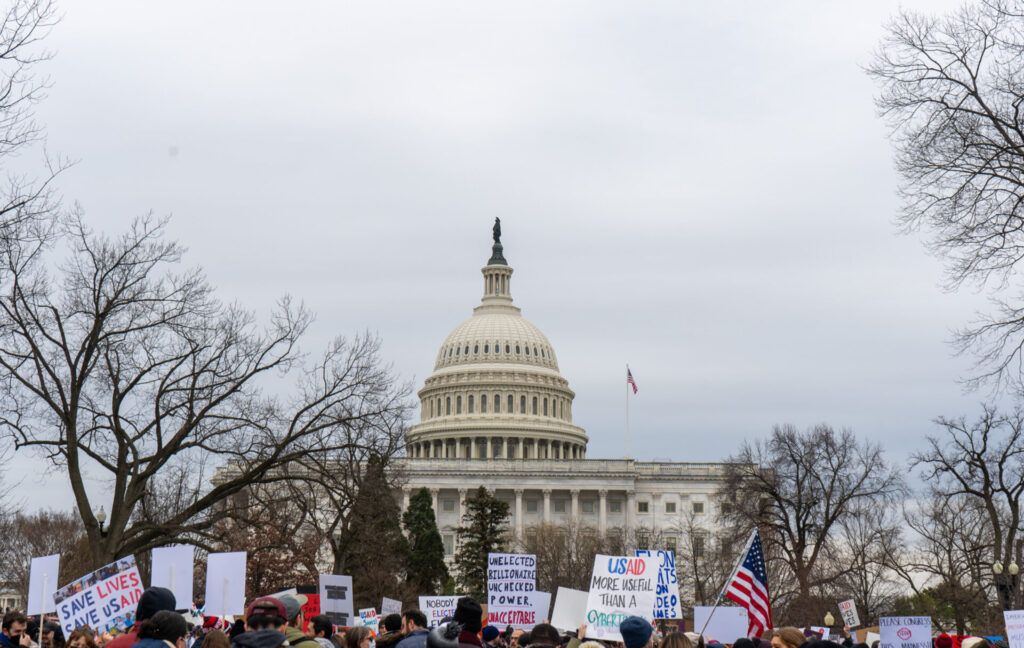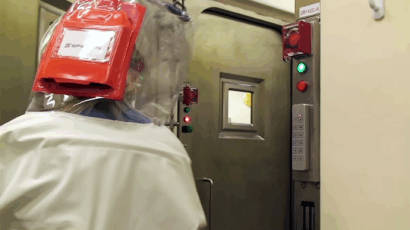How the shutdown of USAID will hurt Americans and empower foreign adversaries
By Erik English | February 7, 2025
 Protesters demonstrating in support of USAID on Wednesday, February 5th, 2025 in Washington, DC.
Protesters demonstrating in support of USAID on Wednesday, February 5th, 2025 in Washington, DC.
Editor’s note: Late on Friday, a federal judge issued a restraining order to pause some parts of the Trump administration’s attempt to shut down USAID. The ruling came in a lawsuit filed by a union representing federal workers. A hearing on the case is set for Wednesday, the New York Times reported.
Elon Musk, the world’s richest man, and the Department of Government Efficiency (DOGE) he leads are burrowing into the United States government, accessing highly secure information, firing federal employees, and attempting to shut down federal agencies. DOGE access to Office of Management and Budget databases and Treasury data, including the Medicare and Medicaid payment system, has already drawn lawsuits and court orders that temporarily limit those incursions. But perhaps the most immediately damaging of Musk’s actions so far is the rapid closure of the United States Agency for International Development (USAID) and the decimation of America’s foreign aid sector.
USAID was created by President John F. Kennedy’s executive order in 1961 and later established as an independent agency by Congress. Only Congress has the power to abolish it. As a Congressional Research Service report issued Monday says, “Because Congress established USAID as an independent establishment (defined in 5 U.S.C. 104) within the executive branch, the President does not have the authority to abolish it; congressional authorization would be required to abolish, move, or consolidate USAID.” But that legal restriction hasn’t stopped Musk and his team of young DOGE engineers from placing federal employees on leave or firing them outright. The doors to USAID have been locked and all international staff have been instructed to close their missions and return home.
Charlie Warzel wrote in the Atlantic that Musk’s actions were “nothing short of an administrative coup.” At a protest denouncing the closure on Wednesday outside of the Capital, Sara Jacobs, a representative from California, called Musk’s actions “illegal” and “a coup.” USAID employees held signs denouncing Musk and chanted, “Stop the coup!”
How USAID was shuttered. The initial blow to USAID came from a memo from Marco Rubio at the State Department on January 24th, which called for a 90-day freeze on all foreign aid. The immediate effects of that memo were chaotic and far-reaching.
Health clinics closed their doors around the world, HIV drugs were withheld, and refugee camps feared their infrastructure would collapse. ProPublica reported that camp managers in Syria “were told to abandon their site at al-Hawl refugee camp, which is also a prison for ISIS sympathizers. That left the refugees inside with nowhere to turn for basic supplies like food and gas.”
Some officials fear that the closure of USAID could slow the response to ongoing outbreaks of Ebola in Uganda and Marburg virus in Tanzania. USAID and the CDC collaborated in 2022 on a successful effort to limit the spread of an Ebola outbreak in Uganda.
A review period for the alignment of existing work in a new administration is nothing new. A freeze of all funding during the review period is unprecedented. USAID employees were ready to adjust projects to focus on the new administration’s priorities. Then Elon Musk showed up.
Using a cadre of young DOGE engineers, Musk set his sights on USAID this past weekend. USAID’s director of security and his deputy were placed on leave after trying to prevent Musk’s team from accessing personnel files and classified information. Musk’s team then spent a weekend looking through USAID’s systems and evaluating the work. Musk later called the organizations a “ball of worms” but provided no evidence to support his claim that the organization was “beyond repair.”
Soft power and public perception. The purpose of foreign aid is often misunderstood by large segments of the US electorate. USAID was established in the 1960s under John F. Kennedy to counter Soviet influence through foreign assistance during the Cold War. The goal was to provide humanitarian assistance to other countries that would generate goodwill for the United States.
Marco Rubio, now a Secretary of State who seems dead-set on crippling USAID, was once one of its strongest defenders as a tool of soft power. “I promise you it’s going to be a lot harder to recruit someone to anti-Americanism, anti-American terrorism if the United States of America is the reason they’re alive today,” Rubio said on the floor of the Senate in 2017.
Foreign aid also benefits American companies. Last year, a study in the Public Administration and Development journal found that foreign aid increases bilateral trade between the donor and beneficiary country, particularly in Latin America. “For example, the U.S. increased its bilateral trade with recipient countries, gaining $8 in exports for every additional dollar spent on foreign aid,” University of South Florida researcher Laura Mendez wrote.
Popular perceptions of the value and cost of foreign aid are often incorrect. A 2015 poll found that, on average, Americans believed that foreign aid made up more than 30 percent of the federal budget. Only 3 percent accurately responded correctly that the United States spends less than 1 percent of its federal budget on foreign aid.
“Anyone that tells you that we can slash foreign aid and that will bring us to balance is lying to you,” Rubio told a Florida political organization in 2019. “Foreign aid is less than 1 percent of our budget. It’s just not true.”
Legally, it would take an act of Congress to shut down or make changes to USAID—including moving it under the umbrella of the State Department. But that hasn’t stopped Musk or, now, Rubio. The USAID website has been wiped and now bears a notice to all USAID staff that they are on administrative leave and international missions will be shut down.
Congress doesn’t seem eager to intervene, either. Earlier this week, in a conversation on the social media site X, which is owned by Musk, Republican senators Mike Lee and Joni Ernst listened quietly as Musk informed them of his plan to shut down USAID, an action that legally only they and their colleagues in Congress can take.
Mass firings. The long-term implications of the shutdown will be wide-reaching. On Thursday, Marco Rubio’s team shared their plan to reduce the USAID staff from 14,000 people to under 300. Not only does USAID provide life-saving medical interventions and directly employ thousands of Americans, it is also a catalyzing agent for the foreign aid industry.
One foreign aid worker on LinkedIn pointed out that in a typical layoff situation, a company could lay off staff who then take their skills elsewhere. Layoffs at Ford could lead to hiring at Chevrolet, etc. But with the USAID freeze, Musk is shutting down an entire sector. This is not Twitter, Tesla, or SpaceX. In the United States, the foreign aid sector has disappeared.
“It is challenging to explain the scale of the situation and how it will impact America to folks who are just starting to hear about this or who aren’t familiar with USAID and American soft power,” one USAID worker who requested anonymity for fear of reprisal told me. “It’s like the 2008 financial crisis, but no one is getting bailed out. It’s like Walmart going out of business overnight—turning off their website and locking stores with food spoiling on the shelf. It’s like the US pulling out of Afghanistan but in 165 countries all at once.”
It’s not just USAID employees being fired, either. Much of the work of USAID is farmed out to large companies who compete for contracts. They work with local partners around the world to implement programs with direction and guidance from USAID.
Even programs that were popular under the first Trump administration, like Power Africa, which streamlined power-related infrastructure projects across Africa, have been frozen.
Now, all of those companies are shedding staff and stopping work. The sudden and abrupt nature of the freeze creates a vacuum where US foreign aid used to be. Experts worry that China could step in to fill the gap, an action that would cede American influence to a rival nation.
During Robert F. Kennedy Jr.’s confirmation for Secretary of Health, John Cornyn, a Republican senator from Texas, brought up the President’s Emergency Plan for AIDS Relief (PEPFAR): “Failure to continue this program, in my view, would risk ceding that leadership to adversaries like China.” Funding for PEPFAR increased under the first Trump administration and is currently halted by the 90-day foreign aid freeze. There is an exemption waiver for “life-saving” work, but confusion around what qualifies as life-saving has meant that most of that work hasn’t resumed.
“There are other players in this sector,” said one USAID employee who had been placed on administrative leave. China is building infrastructure across Africa as part of its Belt and Road Initiative, and Russia is building military bases in underdeveloped areas around the world. In the absence of an American presence, many countries will have no choice but to turn to America’s adversaries for assistance. “They still need to find a way to get it done.”
The Musk of it all. Elon Musk, whose net worth is nearly 10 times the annual budget of USAID, has said that he would like to implement “zero-based budgeting” at the agency, a process that reduces every budget item to zero, then arguing over which of them should be restored. In his call on Monday, Musk said that if anything proved useful, it could always be turned back on.
What goes unsaid when implementing an approach like zero-based budgeting in the foreign aid sector is that the result of turning everything off will be death, disease, and conflict—disasters that may have otherwise never happened. It is an unimaginably callous and short-sighted way to view foreign aid. Even if programs are allowed to resume after the 90-day freeze, much of the damage—not just to the recipients of USAID assistance, but to US influence in the world—will have already been done.
Together, we make the world safer.
The Bulletin elevates expert voices above the noise. But as an independent nonprofit organization, our operations depend on the support of readers like you. Help us continue to deliver quality journalism that holds leaders accountable. Your support of our work at any level is important. In return, we promise our coverage will be understandable, influential, vigilant, solution-oriented, and fair-minded. Together we can make a difference.
Keywords: DOGE, Elon Musk, USAID, foreign aid
Topics: Analysis
















My Girlfriend lost her job from RTI because of this freeze. How are we going to start a family when the president randomly decides to dismantle government funding to local companies. Our family income has been cut in half. How can we survive this?
Is it just me or is this chaos truly mad…Next up seems to be a complete elimination of the Department of Education.